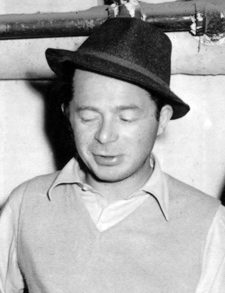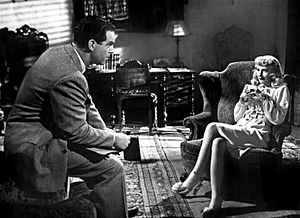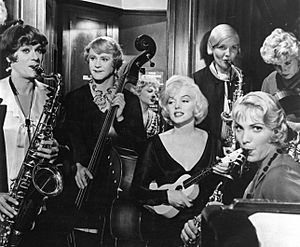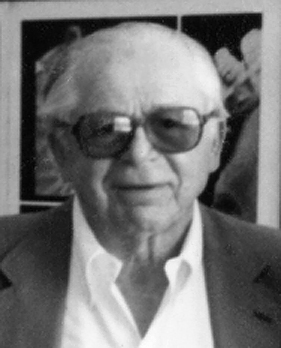Billy Wilder facts for kids
Billy Wilder (born Samuel Wilder; June 22, 1906 – March 27, 2002) was a famous Austrian-American filmmaker. A filmmaker is someone who directs and writes movies. His career in Hollywood lasted for over 50 years.
Many people think he was one of the most brilliant and creative filmmakers of his time. He was nominated for many Academy Awards, also known as Oscars. He won the Best Director Oscar twice and Best Screenplay Oscar three times.
Wilder started as a screenwriter in Berlin, Germany. When the Nazi Party became powerful, he moved to Paris. Then, in 1933, he moved to Hollywood in the United States. He had a big success with the movie Ninotchka (1939). He wrote this film with Charles Brackett and Walter Reisch.
Billy Wilder became well-known as a director with the movie Double Indemnity (1944). He also wrote this film. He won his first Oscars for Best Director and Best Screenplay for The Lost Weekend (1945). This movie also won the Oscar for Best Picture.
In the 1950s, Wilder directed and co-wrote many popular films. These included Sunset Boulevard (1950), Stalag 17 (1953), and Sabrina (1954). He directed Marilyn Monroe in two movies: The Seven Year Itch (1955) and Some Like It Hot (1959).
In 1960, Wilder made The Apartment. This film won him Oscars for Best Picture, Best Director, and Best Original Screenplay. He often worked with actor Jack Lemmon and later with Walter Matthau. Other famous films he directed include One, Two, Three (1961) and Irma la Douce (1963).
Wilder received many awards throughout his career. Several of his films are considered among the greatest American movies ever made. These include Double Indemnity, Sunset Boulevard, Some Like It Hot, and The Apartment. Seven of his films are kept in the United States National Film Registry. This means they are important for culture and history.
Billy Wilder's gravestone has a famous quote: "I'm a writer but then nobody's perfect." This is a funny reference to the last line of his movie Some Like It Hot.
Contents
Early Life and Beginnings
Growing Up in Europe
Samuel Wilder was born on June 22, 1906. His family were Polish Jews. They lived in a small town called Sucha Beskidzka. At that time, this town was part of the Austro-Hungarian Empire. His mother, Eugenia, nicknamed him "Billie." He later changed it to "Billy" when he came to America.
Billy's older brother, W. Lee Wilder, also became a filmmaker. His parents owned a successful cake shop. This shop grew into a chain of cafes at train stations. But Billy's parents did not want him to join the family business.
His family later moved to Vienna, Austria. Instead of going to college, Wilder became a journalist. In 1926, he met and interviewed the jazz band leader Paul Whiteman. Whiteman liked Wilder and took him to Berlin, Germany. There, Wilder made more connections in the entertainment world. Before becoming a successful writer, he even worked as a taxi dancer in Berlin.
Career in Film
Early Work in Germany
Wilder started by writing crime and sports stories for newspapers. Soon, he got a regular job at a Berlin newspaper. He became interested in movies and began working as a screenwriter. From 1929 to 1933, he wrote twelve German films.
He worked with other new filmmakers on the 1930 movie People on Sunday. This film was different from other German movies of the time. It was seen as a new style of filmmaking. He also wrote the screenplay for Emil and the Detectives (1931).
Moving to Hollywood
After Adolf Hitler came to power in Germany, Wilder moved to Paris. He directed his first film there, Mauvaise Graine (1934). Before this movie was released, he moved to Hollywood.
Sadly, Wilder's mother, grandmother, and stepfather died during the Holocaust. This was a very difficult time for him.
In Hollywood, Wilder continued to work as a screenwriter. He became a citizen of the United States in 1939. His first big success was Ninotchka. He wrote this romantic comedy with Ernst Lubitsch. The movie starred Greta Garbo, who was known for serious roles. This film showed a new side of her.
Wilder often wrote with Charles Brackett from 1938 to 1950. Brackett said that Wilder would often take his ideas, change them a little, and then present them as his own. Wilder followed Ninotchka with other hits in 1942. These included Hold Back the Dawn and his first Hollywood directing job, The Major and the Minor.
Success in the 1940s
His third film as a director was Double Indemnity. This crime film starred Fred MacMurray, Barbara Stanwyck, and Edward G. Robinson. It was a huge hit. The movie was nominated for seven Academy Awards. Wilder co-wrote it with Raymond Chandler. This film helped define the "film noir" style. It also pushed the boundaries of what movies could show at the time.
In 1945, Wilder directed a documentary film called Death Mills. The United States government made this film for German audiences. It showed the terrible things done by the Nazi regime.
Two years later, Wilder directed The Lost Weekend. This film won many awards. It won the top prize at the Cannes Film Festival. It also won four Academy Awards, including Best Picture. Wilder won Oscars for Best Director and Best Screenplay.
The 1950s and Beyond
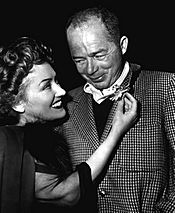
In 1950, Wilder co-wrote and directed Sunset Boulevard. This movie was about a forgotten silent film actress. It was nominated for eleven Academy Awards. Wilder and Brackett won the Oscar for Best Original Screenplay.
In 1951, Wilder directed Ace in the Hole. This film starred Kirk Douglas. It was about how the media can take advantage of a tragic event. At first, it was not very popular, but its reputation has grown over time.
Wilder then directed three movies based on Broadway plays. These included the war drama Stalag 17 (1953). William Holden won an Oscar for his role in this film. He also directed the romantic comedy Sabrina (1954). Audrey Hepburn was nominated for an Oscar for her role.
Another famous film was The Seven Year Itch (1955). This movie features the iconic image of Marilyn Monroe standing over a subway grate. Her white dress blows up from a passing train.
In 1957, Wilder directed three more films. These were The Spirit of St. Louis, Love in the Afternoon, and Witness for the Prosecution. He received an Oscar nomination for Best Director for Witness for the Prosecution.
In 1959, Wilder worked with Marilyn Monroe again in Some Like It Hot. This comedy was set during the Prohibition era. Jack Lemmon and Tony Curtis played musicians who dress as women. They do this to escape a Chicago gang. The film was a big success. It is now considered one of the best American comedies ever made.
The 1960s and Final Films
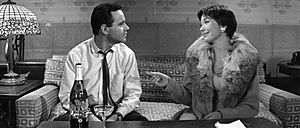
In 1960, Wilder directed The Apartment. This romantic comedy was a huge success. It won ten Academy Award nominations and five awards. Wilder won for Best Picture, Best Director, and Best Screenplay.
He then directed the comedy One, Two, Three (1961). This film starred James Cagney. It was a fast-paced and funny movie. He followed this with Irma la Douce (1963), starring Jack Lemmon. This film was one of the highest-earning movies of that year.
Wilder's later films included Avanti! (1972). This movie followed a businessman trying to get his father's body from Italy. His final films were Fedora and Buddy Buddy.
Wilder had hoped to make a film about the Holocaust. He wanted it to be a memorial to his family members who died. He praised Steven Spielberg's film Schindler's List. To those who denied the Holocaust, Wilder once wrote, "If the concentration camps and the gas chambers were all imaginary, then please tell me—where is my mother?"
Directing Style
Wilder believed that the story and writing were the most important parts of a film. He tried to avoid fancy camera shots that might distract the audience. His films had strong plots and memorable conversations. Even though his directing style was simple, his movies often explored new and sometimes challenging topics.
He was very good at working with actors. He brought back silent film stars like Gloria Swanson for Sunset Boulevard. Roger Ebert, a famous film critic, said that Wilder took his characters seriously. This helped make his comedies even funnier.
Wilder liked to cast actors in unexpected roles. For example, he cast Fred MacMurray as a tricky character in Double Indemnity. MacMurray was usually known for playing nice, thoughtful characters. Humphrey Bogart also played a warmer role in Sabrina.
Wilder directed many actors who received Oscar nominations. These include Barbara Stanwyck, Ray Milland, William Holden, Gloria Swanson, Audrey Hepburn, Jack Lemmon, and Shirley MacLaine. He worked with Jack Lemmon on seven films.
Wilder was also against the House Un-American Activities Committee (HUAC). This committee investigated people in Hollywood for suspected communist ties. Wilder stood up for those who were questioned.
Retirement and Legacy
Billy Wilder received many honors later in his life. He got the American Film Institute Life Achievement Award in 1986. He also received the Kennedy Center Honors in 1990. He has a star on the Hollywood Walk of Fame.
Wilder was known for having a great art collection. He collected modern art, including works by Picasso. He also created his own art. In 1993, an exhibition of his artwork was held.
Personal Life
Wilder married Judith Coppicus in 1936. They had twin sons, but one died shortly after birth. They divorced in 1946. Wilder then married Audrey Young in 1949.
Billy Wilder passed away from pneumonia on March 27, 2002. He was buried in California. A French newspaper wrote about his death with the headline: "Billy Wilder is dead. Nobody is perfect."
Legacy in Film
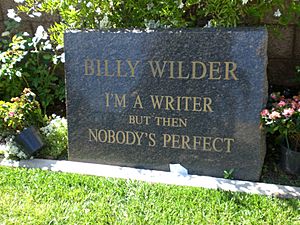
Billy Wilder played a big part in changing what movies could show in Hollywood. He made two of the most important "film noir" movies: Double Indemnity and Sunset Boulevard.
He is also known for his comedies. Five of his films are on the American Film Institute's list of 100 funniest American films. Some Like it Hot is at the very top of that list. The Apartment and The Seven Year Itch are also on the list.
The American Film Institute has ranked four of Wilder's films among the top 100 American films of the 20th century. These are Sunset Boulevard, Some Like It Hot, Double Indemnity, and The Apartment.
Many famous filmmakers have praised Billy Wilder. Spanish filmmaker Fernando Trueba thanked Billy Wilder when he won an Oscar. French filmmaker Michel Hazanavicius also thanked Billy Wilder three times in his Oscar acceptance speech.
Wilder was nominated for 12 Academy Awards for his screenwriting. This was a record for many years. In 2017, Vulture.com named him the greatest screenwriter of all time.
Filmography
Awards and Honors
Billy Wilder received 21 nominations at the Academy Awards, winning six. He was nominated 13 times for his screenwriting and eight times for his directing. He won both Best Director and Best Original Screenplay for The Lost Weekend (1945) and The Apartment (1960).
The Lost Weekend also won the top prize at the Cannes Film Festival. The Apartment won him a BAFTA Award for Best Film. He won seven Writers Guild of America Awards. He also received many lifetime achievement awards. These include the Irving G. Thalberg Memorial Award and the Honorary Golden Bear from the Berlin International Film Festival.
See also
 In Spanish: Billy Wilder para niños
In Spanish: Billy Wilder para niños
- List of film director and actor collaborations
- List of refugees
Images for kids


